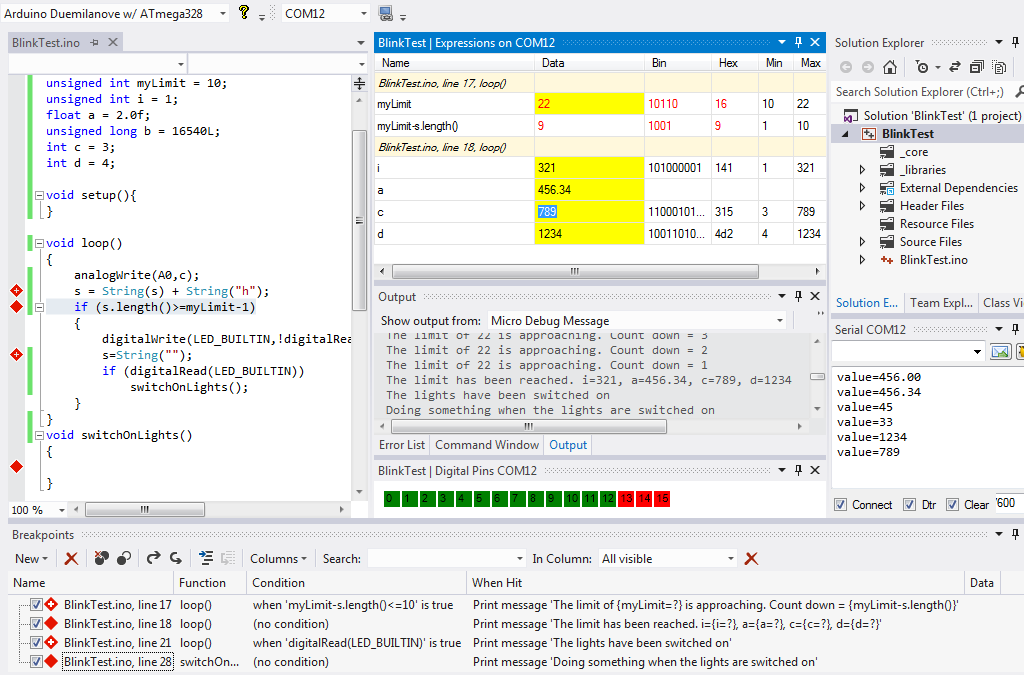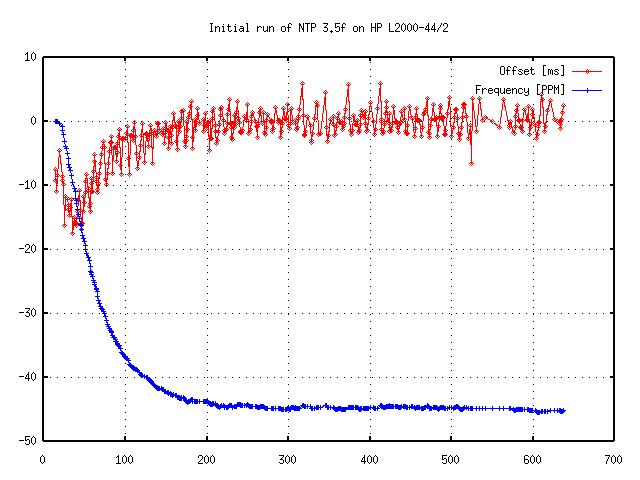#include <ESP8266WiFi.h>
#include <WiFiUdp.h>
char ssid[] = "*******************"; // your network SSID (name)
char pass[] = "******************"; // your network password
unsigned int localPort = 2390; // local port to listen for UDP packets
/* Don't hardwire the IP address or we won't get the benefits of the pool.
Lookup the IP address for the host name instead */
//IPAddress timeServer(129, 6, 15, 28); // time.nist.gov NTP server
IPAddress timeServerIP; // time.nist.gov NTP server address
const char* ntpServerName = "time.nist.gov";
const int NTP_PACKET_SIZE = 48; // NTP time stamp is in the first 48 bytes of the message
byte packetBuffer[ NTP_PACKET_SIZE]; //buffer to hold incoming and outgoing packets
#define GMT 3 //часовой пояс
long evTimeClock;
byte state_clock = 1;
// A UDP instance to let us send and receive packets over UDP
WiFiUDP udp;
byte weekday;// день недели
byte day;// число месяца
int year;// год
byte month;// месяц
int month_days; //дней в месяце
long count_day; //количество дней с 1970 года 1 яанваря по текущее время
long v_year; //кличество дней в году
long next_year; //количество дней с 1970 года 1 яанваря, до зовершения текущего года
int next_month; //количество дней от ночала текущего года до зовершения текущего месяца
int count_day_curent_year; //сколько прошло дней в текущем году
void setup()
{
Serial.begin(115200);
Serial.println();
Serial.println();
// We start by connecting to a WiFi network
Serial.print("Connecting to ");
Serial.println(ssid);
WiFi.begin(ssid, pass);
while (WiFi.status() != WL_CONNECTED) {
delay(500);
Serial.print(".");
}
Serial.println("");
Serial.println("WiFi connected");
Serial.println("IP address: ");
Serial.println(WiFi.localIP());
Serial.println("Starting UDP");
udp.begin(localPort);
Serial.print("Local port: ");
Serial.println(udp.localPort());
evTimeClock = millis();
}
void receiv_time_clock() {
int cb = udp.parsePacket();
if (!cb) {
Serial.println("no packet yet");
}
else {
Serial.print("packet received, length=");
Serial.println(cb);
// We've received a packet, read the data from it
udp.read(packetBuffer, NTP_PACKET_SIZE); // read the packet into the buffer
//the timestamp starts at byte 40 of the received packet and is four bytes,
// or two words, long. First, esxtract the two words:
unsigned long highWord = word(packetBuffer[40], packetBuffer[41]);
unsigned long lowWord = word(packetBuffer[42], packetBuffer[43]);
// combine the four bytes (two words) into a long integer
// this is NTP time (seconds since Jan 1 1900):
unsigned long secsSince1900 = highWord << 16 | lowWord;
Serial.print("Seconds since Jan 1 1900 = " );
Serial.println(secsSince1900);
// now convert NTP time into everyday time:
Serial.print("Unix time = ");
// Unix time starts on Jan 1 1970. In seconds, that's 2208988800:
const unsigned long seventyYears = 2208988800UL;
// subtract seventy years:
unsigned long epoch = (secsSince1900 - seventyYears) + (3600 * GMT);
// print Unix time:
Serial.println(epoch);
count_day = epoch / 86400L;// прошедшее количество дней с 1 яанваря 1970 года
Serial.print("count day on Jan 1 1970: ");
Serial.println(count_day);
year = 1970;// старт отсчета лет
for (int i = 0; i <= count_day; i ++) {
if (((year % 4 == 0) && (year % 100 != 0)) || (year % 400) == 0) { //если год високосный
v_year = 366; // то количество дней в високосном году 366
} else {
v_year = 365;//иначе количество дней в НЕ високосном году 365
}
if (i <= v_year) {
next_year = v_year;
}
if (i == next_year) {
year++;
if (((year % 4 == 0) && (year % 100 != 0)) || (year % 400) == 0) { //если год високосный
v_year = 366; // то количество дней в високосном году 366
} else {
v_year = 365;//иначе количество дней в НЕ високосном году 365
}
next_year = next_year + v_year;
}
}
count_day_curent_year = (count_day - (next_year - v_year))+1; // сколько прошло дней сначала этого (текущего) года (не полных, наверное по этому +1).
month = 1;
for(int m = 0; m <= count_day_curent_year; m ++){
if(month == 1)month_days = 31;
if(m <= month_days)next_month = month_days;
if(m == next_month){
month ++;
if(v_year == 366 && month == 2)month_days = 29;
if(v_year == 365 && month == 2)month_days = 28;
if(month == 1 || month == 3 || month == 5 || month == 7 || month == 8 || month == 10 || month == 12)month_days = 31;
if(month == 4 || month == 6 || month == 9 || month == 11)month_days = 30;
next_month = next_month + month_days;
}
}
day = count_day_curent_year - (next_month - month_days);
Serial.print("count_day_curent_year: ");
Serial.println(count_day_curent_year);
Serial.print("Tekushchiy god visokosnay?: ");
if(v_year == 365)Serial.println("No");
if(v_year == 366)Serial.println("Yes");
Serial.print("next_year: "); //количество дней с 1970 года 1 яанваря, что бы начался новый год или закончился текущий
Serial.println(next_year);
Serial.print("next_month: ");// количество дней с начала текущего года, для того что бы начался новый месяц или закончился текущий
Serial.println(next_month);
Serial.print("year: "); //текущий год
Serial.println(year);
Serial.print("month: "); //текущий месяц
Serial.println(month);
Serial.print("day: "); //текущий день месяца
Serial.println(day);
weekday = (count_day - 3) % 7;
Serial.print("weekday: "); //день недели
Serial.println(weekday);
Serial.print(day);
Serial.print(" / ");
Serial.print(month);
Serial.print(" / ");
Serial.print(year);
Serial.print(" ---- ");
// вывод часов минут секунд:
Serial.print("The UTC time is "); // UTC is the time at Greenwich Meridian (GMT)
Serial.print((epoch % 86400L) / 3600); // вывод часов (86400 секунд в дне)
Serial.print(':');
if ( ((epoch % 3600) / 60) < 10 ) {
// отображение нуля перед минутами, если их меньше 10
Serial.print('0');
}
Serial.print((epoch % 3600) / 60); // вывод минут (3600 секунд в одном часе)
Serial.print(':');
if ( (epoch % 60) < 10 ) {
// отображение нуля перед секундами, если их меньше 10
Serial.print('0');
}
Serial.println(epoch % 60); // вывод секунд
}
}
// запрашиваем у NTP сервера время
unsigned long sendNTPpacket(IPAddress& address)
{
Serial.println("sending NTP packet...");
// set all bytes in the buffer to 0
memset(packetBuffer, 0, NTP_PACKET_SIZE);
// Initialize values needed to form NTP request
// (see URL above for details on the packets)
packetBuffer[0] = 0b11100011; // LI, Version, Mode
packetBuffer[1] = 0; // Stratum, or type of clock
packetBuffer[2] = 6; // Polling Interval
packetBuffer[3] = 0xEC; // Peer Clock Precision
// 8 bytes of zero for Root Delay & Root Dispersion
packetBuffer[12] = 49;
packetBuffer[13] = 0x4E;
packetBuffer[14] = 49;
packetBuffer[15] = 52;
// all NTP fields have been given values, now
// you can send a packet requesting a timestamp:
udp.beginPacket(address, 123); //NTP requests are to port 123
udp.write(packetBuffer, NTP_PACKET_SIZE);
udp.endPacket();
}
void loop()
{
if ((millis() - evTimeClock) > 1000 && state_clock == 1) {
WiFi.hostByName(ntpServerName, timeServerIP);
sendNTPpacket(timeServerIP); // запрашиваем у NTP сервера время
state_clock = 2;
}
if ((millis() - evTimeClock) > 2000 && state_clock == 2) { //ждем секундачку пока NTP сервер ответит сколько время натикало :)
receiv_time_clock();
state_clock = 3;
}
if ((millis() - evTimeClock) > 10000 && state_clock == 3) { // через минуточку повторяем все сначало.
evTimeClock = millis();
state_clock = 1;
}
}


